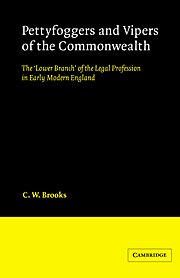 Pettyfoggers and Vipers of the Commonwealth
Pettyfoggers and Vipers of the Commonwealth Book contents
- Frontmatter
- Contents
- List of tables and figures
- Preface
- Abbreviations
- 1 Introduction
- 2 Lawyers and the royal courts in London during the reign of Elizabeth
- 3 The legal profession in the provinces
- 4 The increase in litigation
- 5 The causes of the increase in litigation
- 6 The increase in litigation and the legal profession
- 7 The attitudes of layman and attempts at reform
- 8 Clerkship, the inns of chancery, and legal education
- 9 Private practice
- 10 Public office and politics
- 11 Fees and incomes
- 12 Conclusion
- Appendix: Analysis of the social status of litigants in King's Bench and Common Pleas, 1560–1640
- Notes
- Select bibliography
- Index
- CAMBRIDGE STUDIES IN ENGLISH LEGAL HISTORY
7 - The attitudes of layman and attempts at reform
Published online by Cambridge University Press: 28 October 2009
- Frontmatter
- Contents
- List of tables and figures
- Preface
- Abbreviations
- 1 Introduction
- 2 Lawyers and the royal courts in London during the reign of Elizabeth
- 3 The legal profession in the provinces
- 4 The increase in litigation
- 5 The causes of the increase in litigation
- 6 The increase in litigation and the legal profession
- 7 The attitudes of layman and attempts at reform
- 8 Clerkship, the inns of chancery, and legal education
- 9 Private practice
- 10 Public office and politics
- 11 Fees and incomes
- 12 Conclusion
- Appendix: Analysis of the social status of litigants in King's Bench and Common Pleas, 1560–1640
- Notes
- Select bibliography
- Index
- CAMBRIDGE STUDIES IN ENGLISH LEGAL HISTORY
Summary
Viewed from inside the lower branch, then, the late-sixteenth-century boom in legal business was something of a mixed blessing. The profession had become more centralized and it enjoyed plenty of work, but at the same time the traffic in legal offices and the growth in the numbers of practitioners created serious internal tensions. Even important changes in procedural law arose from internal conflicts rather than from the successful prosecution of agreed programmes of reform. If we turn now to consider public reactions to these same developments, we again find paradox and inconsistency. People were using the courts in ever increasing numbers. So, in one sense, the increase in central court litigation, and the increase in the number of lawyers who helped to make it possible, can be seen as a positive social good, as the spread of a valuable service to greater numbers of people. However, it is clear that most articulate men of the period did not see things in this way. To them, the increase in litigation was a disaster, and the lawyers who brought the cases into the courts a group of dishonest tricksters who were a cancer in the body of the commonwealth. Allegations that attorneys stirred up unnecessary suits were accompanied by accusations that court officials were corrupt and charged extortionate fees. Such views have greatly influenced the picture of the legal profession and the legal system which has come down in the writings of modern historians.
- Type
- Chapter
- Information
- Pettyfoggers and Vipers of the CommonwealthThe 'Lower Branch' of the Legal Profession in Early Modern England, pp. 132 - 150Publisher: Cambridge University PressPrint publication year: 1986
- 1
- Cited by


